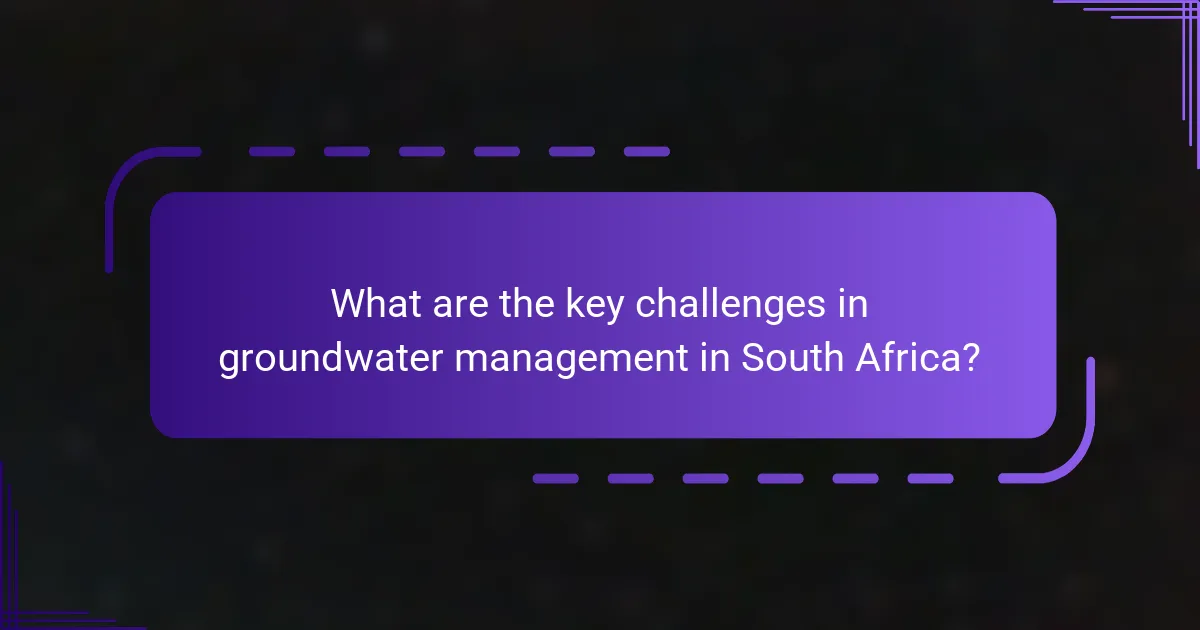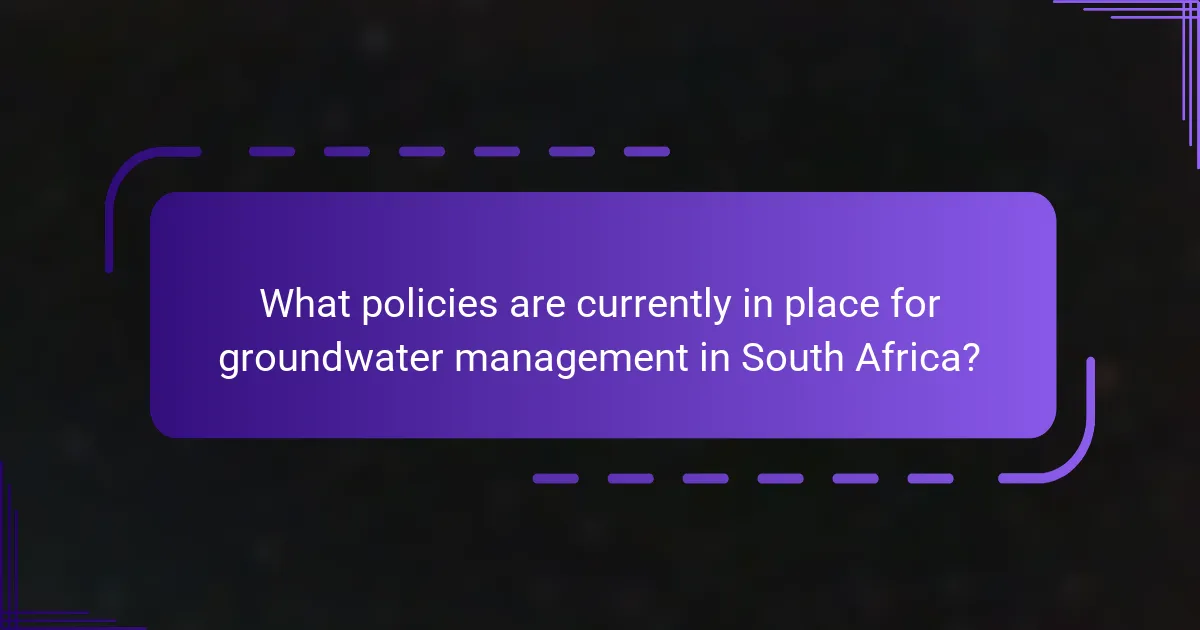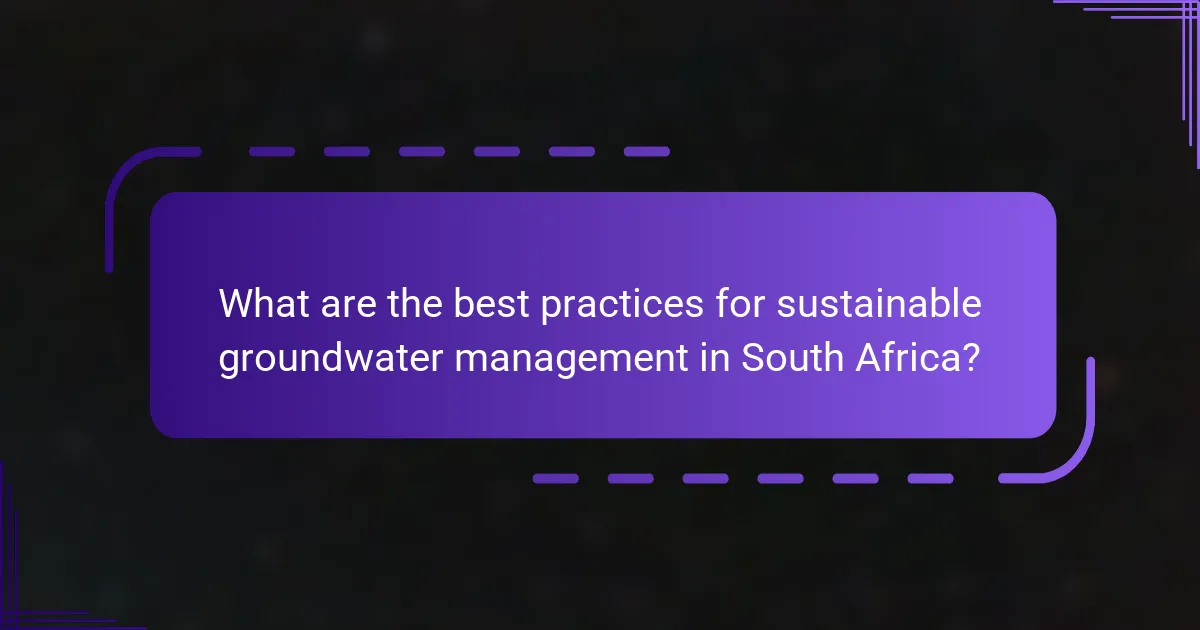Groundwater management in South Africa faces significant challenges, including over-extraction, pollution, and inadequate infrastructure, which threaten the sustainability and quality of this vital resource. The increasing demand for water driven by agriculture and urbanization leads to declining water tables, while pollution from agricultural runoff and industrial activities contaminates groundwater supplies. Current policies, such as the National Water Act of 1998 and the National Water Resource Strategy, aim to regulate and protect water resources through equitable access and sustainable management practices. Best practices for sustainable groundwater management include integrated water resource management, regular monitoring of groundwater levels, and the implementation of water conservation techniques, all of which are essential for enhancing groundwater sustainability and resilience in the face of climate change.

What are the key challenges in groundwater management in South Africa?
Key challenges in groundwater management in South Africa include over-extraction, pollution, and inadequate infrastructure. Over-extraction occurs due to increasing demand for water from agriculture and urbanization. This leads to a decline in water tables, affecting sustainability. Pollution from agricultural runoff and industrial activities contaminates groundwater resources. Inadequate infrastructure hampers effective monitoring and management of groundwater supplies. Additionally, limited data on groundwater resources complicates decision-making. Climate change further exacerbates these challenges by altering precipitation patterns. These factors collectively threaten the availability and quality of groundwater in South Africa.
How do climate change and drought impact groundwater resources?
Climate change and drought significantly reduce groundwater resources. Increased temperatures lead to higher evaporation rates. This reduces surface water availability, which is crucial for groundwater recharge. Drought conditions further exacerbate this issue by limiting precipitation. A study by the World Resources Institute states that prolonged drought can decrease groundwater levels by up to 30%. As a result, water scarcity becomes a pressing issue for agricultural and domestic use. Groundwater depletion can also lead to land subsidence and reduced water quality. These impacts highlight the urgent need for effective groundwater management strategies.
What evidence exists regarding the effects of climate change on groundwater levels?
Climate change significantly affects groundwater levels. Research indicates that rising temperatures lead to increased evaporation rates. This evaporation reduces surface water availability, impacting groundwater recharge. Additionally, altered precipitation patterns result in less predictable rainfall. A study by the Intergovernmental Panel on Climate Change highlights these trends. It notes that regions experiencing drought face declining groundwater levels. Conversely, areas with increased rainfall may see temporary rises. However, the overall impact of climate change tends to be negative for groundwater sustainability. These findings are crucial for groundwater management strategies in South Africa.
How do drought conditions exacerbate the challenges of groundwater management?
Drought conditions significantly complicate groundwater management by reducing recharge rates and increasing extraction demands. During droughts, surface water sources diminish, leading to higher reliance on groundwater. This increased demand can cause over-extraction, resulting in declining water tables. A study by the South African Department of Water and Sanitation in 2020 indicated that groundwater levels dropped by 30% in some regions during prolonged droughts. Additionally, droughts can lead to land subsidence and reduced aquifer storage capacity. These factors create a cycle of scarcity and stress on groundwater resources, making sustainable management increasingly difficult.
What role do human activities play in groundwater depletion?
Human activities significantly contribute to groundwater depletion. Over-extraction of water for agriculture, industry, and domestic use leads to lower water tables. In South Africa, irrigation practices consume approximately 60% of total groundwater resources. Urban development increases impermeable surfaces, reducing natural recharge. Pollution from agricultural runoff and industrial waste further complicates groundwater quality. Deforestation reduces soil moisture retention, exacerbating depletion. Climate change impacts, driven by human actions, alter precipitation patterns and increase evaporation rates. These combined factors highlight the critical role of human activities in groundwater depletion.
How does agricultural practice influence groundwater quality and availability?
Agricultural practices significantly influence groundwater quality and availability. Intensive farming often leads to the use of fertilizers and pesticides. These chemicals can leach into the groundwater, causing contamination. For example, nitrates from fertilizers can elevate levels in water sources, affecting human health. Additionally, over-irrigation can deplete groundwater reserves. This results in reduced water availability for both agricultural and domestic use. Studies indicate that regions with heavy agricultural activity often report declining groundwater levels. Effective management practices are essential to mitigate these impacts and ensure sustainable groundwater resources.
What urban development practices contribute to groundwater contamination?
Urban development practices that contribute to groundwater contamination include improper waste disposal, excessive use of fertilizers, and inadequate stormwater management. Improper waste disposal introduces hazardous substances into the soil and water systems. Excessive use of fertilizers leads to nutrient runoff that contaminates groundwater. Inadequate stormwater management can cause pollutants to enter water sources during heavy rains. Urbanization often increases impervious surfaces, which prevents natural filtration of water. A study by the Water Research Commission of South Africa highlights that urban runoff is a significant source of groundwater pollution. These practices collectively degrade water quality and threaten public health.

What policies are currently in place for groundwater management in South Africa?
The policies currently in place for groundwater management in South Africa include the National Water Act of 1998 and the National Water Resource Strategy. The National Water Act regulates the use, management, and protection of water resources, including groundwater. It emphasizes equitable access and sustainable use of water resources. The National Water Resource Strategy outlines the framework for managing water resources in a way that supports economic growth and environmental sustainability. It includes measures for groundwater monitoring and protection. South Africa also implements Integrated Water Resource Management to ensure a holistic approach to water management. These policies aim to address challenges such as water scarcity and pollution.
How does the National Water Act address groundwater issues?
The National Water Act addresses groundwater issues by establishing a framework for sustainable management. It recognizes groundwater as a vital resource and integrates it into national water resource planning. The Act mandates the protection of groundwater quality and quantity. It also requires licensing for groundwater use to prevent over-extraction. Furthermore, the Act promotes equitable access to groundwater resources. It emphasizes the need for stakeholder participation in groundwater management. The Act sets guidelines for monitoring and assessing groundwater resources. These measures aim to ensure the long-term sustainability of groundwater in South Africa.
What are the main provisions of the National Water Act relevant to groundwater?
The National Water Act includes several key provisions relevant to groundwater management. It establishes the principle of public trusteeship over water resources. This means that groundwater is considered a national resource, managed for the benefit of all South Africans.
The Act requires that groundwater use be licensed. Licenses are necessary for abstraction to ensure sustainable management. The Act also promotes equitable access to water resources. It aims to address historical imbalances in water distribution.
Moreover, the Act mandates the protection of water quality. This includes measures to prevent pollution of groundwater sources. The establishment of catchment management agencies is also a provision. These agencies are responsible for managing water resources at a local level.
Overall, the National Water Act aims to promote sustainable and equitable groundwater management in South Africa.
How is compliance with the National Water Act monitored and enforced?
Compliance with the National Water Act is monitored and enforced through various mechanisms. The Department of Water and Sanitation oversees adherence to the Act. Regular assessments are conducted to evaluate water use and allocation. These assessments involve inspections and reporting from water users. Non-compliance can result in penalties or legal action. The National Water Act also empowers officials to issue directives for corrective actions. Public participation is encouraged in monitoring efforts. Stakeholders can report violations, enhancing accountability. This multi-faceted approach ensures effective enforcement of the Act.
What are the roles of local and provincial governments in groundwater management?
Local and provincial governments play critical roles in groundwater management. They are responsible for implementing policies that regulate groundwater extraction. Local governments oversee the enforcement of water use permits and monitor groundwater levels. They also manage local water resources and conduct assessments of water quality. Provincial governments develop broader regulations and frameworks for groundwater management. They coordinate with local authorities to ensure compliance with national laws. Both levels of government work together to promote sustainable practices in groundwater usage. This collaboration is essential for addressing challenges such as over-extraction and contamination. Effective groundwater management requires the integration of local knowledge and provincial oversight.
How do local regulations complement national policies on groundwater management?
Local regulations enhance national policies on groundwater management by addressing specific regional needs. They provide tailored solutions that reflect local hydrogeological conditions. National policies set broad frameworks, while local regulations fill in the details. For instance, local regulations can impose stricter water use restrictions in areas facing over-extraction. They can also establish monitoring systems that align with national objectives. This alignment ensures effective resource management at all levels. In South Africa, local regulations may incorporate community input, promoting sustainable practices. This localized approach supports national goals by ensuring compliance and fostering stewardship.
What challenges do local governments face in implementing groundwater policies?
Local governments face several challenges in implementing groundwater policies. Limited financial resources hinder effective policy execution. Inadequate technical expertise often results in poorly designed policies. Conflicting interests among stakeholders complicate decision-making processes. Insufficient data on groundwater resources affects policy planning and management. Regulatory frameworks may be outdated or insufficient to address current issues. Additionally, public awareness and engagement in groundwater conservation remain low. These factors collectively impede the successful implementation of groundwater policies at the local level.

What are the best practices for sustainable groundwater management in South Africa?
The best practices for sustainable groundwater management in South Africa include integrated water resource management, regular monitoring of groundwater levels, and the implementation of water conservation techniques. Integrated water resource management promotes collaboration among stakeholders to ensure efficient use of water resources. Regular monitoring helps in understanding aquifer conditions and identifying over-extraction risks. Water conservation techniques, such as rainwater harvesting and efficient irrigation practices, reduce dependency on groundwater. Additionally, public awareness campaigns educate communities on sustainable usage. Research indicates that these practices can enhance groundwater sustainability and resilience against climate variability.
How can community engagement improve groundwater management practices?
Community engagement can significantly enhance groundwater management practices by fostering local involvement and awareness. Engaged communities are more likely to adopt sustainable practices. They can contribute valuable local knowledge about groundwater resources. This knowledge can improve data accuracy for better decision-making. Active participation leads to increased accountability among stakeholders. Moreover, community members can collaborate on monitoring and managing water usage. Evidence shows that regions with strong community involvement report better groundwater quality. Engaged communities can also advocate for policies that protect local water resources.
What successful community-led initiatives have been implemented in South Africa?
Successful community-led initiatives in South Africa include the Working for Water program and the Catchment Management Agencies. The Working for Water program focuses on removing invasive plant species to improve water availability. It has created thousands of jobs and enhanced ecosystem health since its inception in 1995. Catchment Management Agencies empower local communities to manage water resources sustainably. They promote stakeholder participation in decision-making processes. These initiatives have led to improved groundwater management and increased community awareness about water conservation. They demonstrate the effectiveness of local involvement in environmental stewardship.
How can education and awareness campaigns foster better groundwater stewardship?
Education and awareness campaigns can significantly enhance groundwater stewardship by informing communities about the importance of groundwater conservation. These campaigns provide essential information on sustainable practices and the impacts of over-extraction. For instance, educating farmers about efficient irrigation techniques can reduce water waste. Awareness initiatives can also highlight the connection between groundwater quality and public health. Studies show that communities engaged in educational programs are more likely to adopt conservation measures. In South Africa, campaigns have led to improved water management practices in various regions. Ultimately, informed citizens are better equipped to protect and manage groundwater resources effectively.
What technologies are available for monitoring and managing groundwater resources?
Technologies for monitoring and managing groundwater resources include remote sensing, groundwater modeling, and automated monitoring systems. Remote sensing utilizes satellite imagery to assess groundwater levels and quality over large areas. Groundwater modeling involves computer simulations to predict groundwater flow and contaminant transport. Automated monitoring systems employ sensors to continuously track groundwater levels, temperature, and quality parameters. These technologies enhance data collection and decision-making processes. For example, the use of remote sensing can cover vast regions, providing insights into aquifer conditions that would be difficult to obtain through traditional methods. Automated systems can offer real-time data, improving response times to changes in groundwater conditions.
How do remote sensing and GIS contribute to effective groundwater management?
Remote sensing and GIS enhance effective groundwater management by providing precise data and analysis. They enable the monitoring of groundwater levels and quality over large areas. Remote sensing technologies can identify changes in land use and vegetation cover that impact groundwater recharge. GIS facilitates spatial analysis, allowing for the integration of various data sources. This integration helps in mapping aquifer boundaries and identifying recharge zones. Studies show that using these technologies can improve decision-making and resource allocation. For instance, a study by Sinha et al. (2020) highlighted that GIS-based models increased groundwater sustainability in South Africa. By visualizing data, stakeholders can better understand groundwater dynamics and implement effective management strategies.
What role do water-saving technologies play in groundwater conservation?
Water-saving technologies significantly contribute to groundwater conservation. These technologies reduce water usage and promote efficient resource management. For instance, drip irrigation systems deliver water directly to plant roots, minimizing evaporation and runoff. According to the Food and Agriculture Organization, implementing such systems can cut water use by up to 50%. Additionally, rainwater harvesting systems capture and store rainwater for later use, further decreasing dependence on groundwater. Studies show that areas utilizing these technologies experience less groundwater depletion. Overall, water-saving technologies are essential for sustainable groundwater management in regions like South Africa.
What practical steps can individuals take to contribute to groundwater sustainability?
Individuals can contribute to groundwater sustainability by adopting water conservation practices. They should fix leaks in plumbing to prevent water wastage. Using water-efficient fixtures can significantly reduce consumption. Collecting rainwater for irrigation is another effective method. Individuals can also limit the use of fertilizers and pesticides, which can contaminate groundwater. Participating in local clean-up efforts helps protect water sources. Additionally, educating others about groundwater issues raises awareness. According to the World Health Organization, efficient water use can reduce demand on groundwater resources.
Groundwater management in South Africa faces significant challenges, including over-extraction, pollution, and inadequate infrastructure, which threaten the sustainability and quality of this vital resource. Climate change and drought further exacerbate these issues by reducing groundwater recharge and increasing demand, leading to alarming declines in water levels. The National Water Act of 1998 and the National Water Resource Strategy provide a framework for sustainable management, yet local and provincial governments encounter obstacles in policy implementation. Best practices, such as integrated water resource management and community engagement, are essential for improving groundwater stewardship and ensuring long-term resource availability. The article will explore these challenges, policies, and effective management strategies in detail.